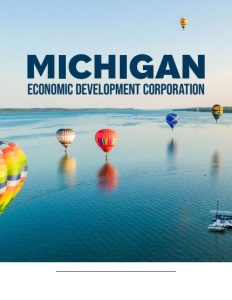Forward – Business View Magazine Responses
By Quentin L. Messer
What are the economic challenges that the state has faced over the past few years?
Michigan has faced its share of economic challenges in recent years, but we’ve met them head-on with grit, determination and strategic investments. Like the rest of the nation, we navigated the impacts of the COVID-19 pandemic, which claimed countless lives, disrupted supply chains, strained small businesses and reshaped workforce dynamics. We’ve also tackled the ongoing transition from the internal combustion engine to other propulsion systems in the automotive sector in the last decade, ensuring that our manufacturers—large and small—are equipped to compete amid the shifting mobility landscape.
Globally, inflationary pressures and economic uncertainty presented hurdles, but through bipartisan collaboration, targeted economic development initiatives and historic investments in our communities, we’ve positioned Michigan for long-term success. The MEDC will continue to execute our ‘Make It in Michigan’ economic development strategy focusing on People, Places, and Projects to ensure that we are well-positioned to navigate potential challenges as they may arise.
We’ve addressed workforce shortages, expanded talent pipelines and ensured that every Michigander has greater access to good-paying jobs in growing industries like clean energy, semiconductors and advanced manufacturing. According to Climate Power, Michigan is no. 1 in the nation for winning projects funded by the Inflation Reduction Act, wrestling in more than $27.84 billion in new investment and supporting over 26,000 good-paying jobs.
Work remains, but I’m confident that Michigan’s best days are ahead as we build an economy that works for everyone.
What are some examples of innovation and/or pivots that the MEDC and/or Michigan businesses adopted to get past said challenges?
Michigan’s economic resilience is built on our ability to innovate, adapt and compete. At the MEDC, we’ve worked alongside businesses to embrace new technologies and invest in our future. A prime example is the Michigan Auto Supplier Transition Program that helps small and mid-sized manufacturers pivot to electrification and clean energy, ensuring they remain competitive in the rapidly evolving mobility sector. This Auto Supplier Transition Program builds upon work that the MEDC has undertaken to assist manufacturers, especially small and medium sized ones, take advantage of the opportunities afforded by Industry 4.0 and continuing productivity gains.
As part of the State’s overall clean energy goals and priorities, Michigan’s Governor Gretchen Whitmer announced the MI Healthy Climate Plan in 2020, which lays out a pathway for Michigan to reach 100% carbon neutrality by 2050 to avert the worst impacts of the climate crisis, create good-paying jobs, and build a healthier and more prosperous, equitable, and sustainable Michigan. Working with public and private stakeholders, including Michigan’s two major energy providers, Consumer’s Energy and DTE Energy, we are collectively and aggressively working toward a clean green future.
In addition, Governor Whitmer has reinforced a commitment to clean energy investments within the state’s budget, including for the re-opening of the Palisades nuclear powerplant. This effort would save 600 good-paying, high-skill jobs, continue delivering clean power to approximately 800,000 homes, and support an economic engine in Southwest Michigan. This is yet another way that Michigan is leading by example for the rest of the nation, as Palisades remains on track to becoming the first successfully restarted nuclear power plant in American history. In doing so, we are showing the world that Michigan will be an epicenter of clean energy production and will do what it takes to save jobs, protect local communities, and deliver reliable power to homes and small businesses.
We’ve also doubled down on talent development through MEDC’s Talent Action Team, which works together with the state’s educational institutions and regional, dedicated workforce development boards to deliver the talent solutions required by businesses to succeed. Working in conjunction with our talent attraction and retention efforts, we are focusing on our Make It in Michigan strategy that is based on the belief that everyone should have the opportunity to succeed right here in our state. Our statewide placemaking efforts invest in projects that make our communities more inclusive and prosperous while adding affordable housing options in communities across Michigan.

Additionally, over the past two years, Team Michigan added senior executives to spearhead creating innovative policy and programming for the state, namely, the nation’s first Chief Growth Officer, Hilary Doe, who led the Growing Michigan Together Council focused on devising strategies for growing the state’s population; and the state’s first Chief Innovation Ecosystem Officer, Ben Marchionna, who is charged with growing Michigan’s growing entrepreneur community and venture capital-backed companies. Further, the Chief Innovation Ecosystem Office houses the following initiatives dedicated to developing innovative solutions:
- Office of Future Mobility and Electrification
- Office of Defense and Aerospace Innovation
What are some success stories of Michigan businesses over the past few years?
While Michigan continues to be the global epicenter of the mobility sector, Michigan’s diverse economy has always been anchored in Michiganders’ ability to grow things and do hard tech/deep tech well. Michigan’s inventiveness continues to accelerate innovation from semiconductors and batteries, to clean energy, fintech and life sciences, to aerospace, agriculture and defense.
Projects showcasing Michigan’s innovation include:
- Fortescue (EV/Mobility) – $210 million in private investment creating 560 new clean energy jobs. Fortescue is revitalizing Detroit’s historic Piquette plant to establish its first U.S. Advanced Manufacturing Center to become the producer of greener manufacturing practices and clean energy growth.
- EcoG (EV/Mobility) – $14.4 million in private investment creating 45 new jobs. EcoG is establishing a U.S. headquarters in Detroit’s Corktown neighborhood to expand its EV fast-charging capabilities and continue to position Michigan not just as a leader in automotive technology – but the equipment that charges it as well.
- Corning (Clean Energy) – $90 million in private investment, creating over 1,100 new jobs. Corning is building a new solar component manufacturing facility in Saginaw County, adding jobs in the clean energy sector while filling a critical gap in the United States’ solar supply chain.
- Clean Hydrogen Hub – Represents $1 billion in investment by the U.S. Department of Energy and 13,360 jobs. The Clean Hydrogen Hub is an alliance between the Michigan-backed clean hydrogen hub project and the Midwest Alliance for Clean Hydrogen with the goal of growing the Midwest’s regional hydrogen value chain to deliver positive climate and community impact.
- Peterson Farms (Agribusiness) – Over $30 million of private capital investment to grow their agribusiness operations on the West Coast of Michigan.
- New Vision Lansing (Placemaking) – Community revitalization project investing over $315 million in the heart of the state’s capital, Lansing, MI.
What are some key investments and developments happening in the state and what does this mean for the local economy?
Our ongoing investments and developments are evidence that Team Michigan’s bipartisan “Make It In Michigan” economic development strategy focuses on attracting and developing people, cultivating and revitalizing places and competing for and winning projects. Executing this strategy will grow Michigan’s prosperity—and population.
I’m pleased that we started 2025 with impactful housing efforts that will directly help Michiganders by providing the peace of mind that comes with a physical space and community they can call home.
Additionally, Michigan has always been at the forefront of advancements in mobility, including driving innovation in autonomous drone technology. Leveraging that leadership, Michigan has launched the Uncrewed Triple Challenge, a state-sponsored competition tasking entrants with using unmanned, autonomous drones to seamlessly transport a package across Michigan — traversing water, air and land.
Companies across the nation, including many in Michigan, are working on the next generation of drones for a wide variety of defense, civilian, and commercial uses. These drones deliver medicine to isolated communities, support military personnel on the front lines, and transport critical manufacturing components to cut down on production delays. With the Uncrewed Triple Challenge, Michigan is making its mark in this sector, which will help drive investment and job growth and continue our leadership in all things mobility.
How important is industry diversification AND what are some new industries that are growing in/coming to the state?
While Michigan has long had a diverse economy, continuous industry diversification is critical to Michigan’s long-term economic success. By expanding beyond our traditional strengths in agribusiness, automotive manufacturing and other advanced manufacturing sectors, we are building a more resilient, future-ready economy that creates employment and entrepreneurial opportunities.
Michigan is seeing tremendous growth in industries like semiconductors, electric vehicle battery manufacturing, life sciences and clean energy technology. We are also emerging as a leader in industries like defense and aerospace, which are bringing good-paying jobs to Michigan and strengthening our position as a hub for innovation and investment. Through strategic initiatives and partnerships, we’re ensuring that businesses of all sizes—especially small and mid-sized companies—can thrive in this evolving economic landscape.

What makes Michigan unique from a growth and development perspective?
Michigan stands out as a national leader in growth and development because of our unmatched combination of innovation, talent and strategic investments. We have a rich deep tech/hard tech legacy that has seen Michigan evolve into a hub for advanced manufacturing industries like mobility, clean energy, semiconductors and life sciences.
With our competitive business climate, world-class universities and commitment to workforce development, we’re ensuring businesses, entrepreneurs and researchers have the resources they need to succeed. We’re leveraging historic federal and state investments to create good-paying jobs, strengthen local communities and build a more sustainable, resilient economy. Home to the Great Lakes, Michigan offers residents and visitors alike the ideal four-season destination to live, work and play. With low costs of living, and excellent quality of life, both talent and employers see Michigan as a top state for business and leisure. Selected stats presenting the Michigan Advantage that sets Michigan apart:
Location:
- Proximity to 20 percent of the world’s freshwater
- Home to the Ambassador Bridge, North America’s most active trade corridor
Industry:
- Over 95% of the Top 100 automotive suppliers have a presence in Michigan
- Home to the second most diverse agricultural sector, Michigan serves as a base for addressing global food security
- The birthplace of life-changing technology, from the invention of the automobile to the home of the Arsenal of Democracy, to the development of the three vaccines which allowed us to emerge from the COVID-19 pandemic.
Place:
- 10% lower than the average cost of living in the U.S.
People:
- Top 10 state for America’s Best Employers for New Grads
- Top 10 state for total STEM degree completions in the nation
What does the economic future look like for Michigan?
The economic future of Michigan is bright, and it’s being built on the foundation of our state’s legendary innovation, world-class workforce and bold bipartisan leadership. We are doubling down on the industries that made us great—automotive, agribusiness and advanced manufacturing—while securing Michigan’s place as a national leader in clean energy, advanced mobility and high-tech job creation in newer sectors like financial and insurance tech.
Our work always remains; however, by leveraging marketing and perception management opportunities like our ‘You Can In Michigan’ talent attraction campaign, and our successful Pure Opportunity business attraction campaign, we are changing the narrative about Michigan, and as a result driving job and entrepreneurial growth. As Team Michigan executes the ‘Make It In Michigan’ economic development strategy focused on People, Places and Projects, we will build more vibrant communities and attract, retain and develop one of the most diverse and qualified workforces in North America.
Through strategic investments, business-friendly policies and strong partnerships across public and private sectors, we are making Michigan the best place to start, grow and invest. Thanks to the leadership of Governor Whitmer and bipartisan legislative collaboration and ethos of teamwork across all levels of government and economic development, Team Michigan is competing—and winning—major projects that bring high-paying jobs and transformational opportunities to communities across all 83 counties while revitalizing communities that are more and more appealing to long-term residents and new Michiganders.


